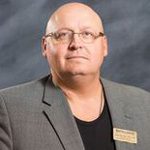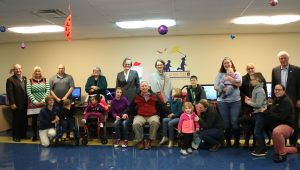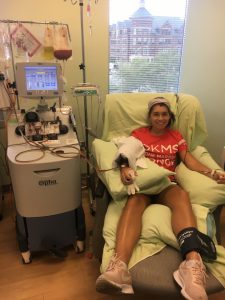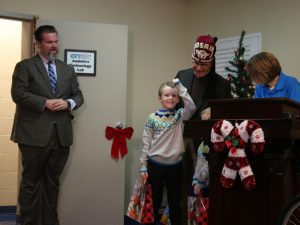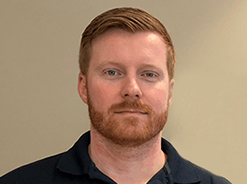The pandemic may have forced it to take place over a video conference instead of in person, but the physical distance didn’t prevent Thursday’s Kosair Charities and enTECH Virtual Day of Celebration from living up to its name in the joyful, celebratory spirit of the holiday season.
Leaders from Spalding University and Kosair Charities joined the online call to meet the families that are receiving gifts of assistive technology for their children who face physical challenges and cognitive differences.
The gifts, to be distributed in the coming weeks through enTECH and its Kosair Charities Financial Assistance Program, will provide the children with therapeutic, educational and sensory benefits and help them with communication, speech, mobility and play.
enTECH Overview| Visit home page of the assistive technology resource center
The gifts included Apple iPads with the latest assistive-technology apps and accessories, switch toys, floatation devices that help with bathing, and communication and writing tools. The devices and apps are often not covered by insurance and can very expensive if purchased out of pocket.
Brittany Farris was thankful that her 23-month-old daughter, Leah, would being receiving a series of specialized switch toys to help her play.
“Most toys that are typical for a child her age, she just cannot play with,” Brittany Farris said. “It’s been one of those things where we’re like, ‘How can we get her switch toys?’ Insurance does not want to pay for play things for children sometimes. So it’s been quite difficult to get some of these items, and we’re just truly so appreciative of each and every item. And I promise we will utilize them and really appreciate what you guys are doing.”
Shamenda Harper Livingston said her sixth-grade son Kinjay would benefit from the LAMP Words for Life communications app he’d be receiving, adding that he has been thriving as an honor-roll student at Johnson Traditional Middle School. Additionally, Kinjay’s new Apple Pencil “will really help him make his letters and writing a little better and more legible,” his mom said.
The Kosair Charities Enabling Technologies of Kentuckiana assistive technology resource center – or enTECH, for short – is a division of Spalding’s Auerbach School of Occupational Therapy and is located on Spalding’s campus at 812 S. Second St. in the former Kosair Shrine Temple. It is one of five state-designated assistive technology resource centers in Kentucky, and it offers a range of therapy services. Kosair Charities is a major supporter of its programs and facilities.
“This partnership with Spalding is so important because Spalding is not afraid to think big and bold, and that’s what we need in this world: big and bold thinking,” Kosair Charities President Keith Inman said. “So this is going to be a partnership that’s going to last a long, long time.
“… We’re just honored that we we have the ability to do the little piece that we can do because what you do at Spalding and enTECH, top to bottom, that’s hard work. For 97 years, we have had one goal, and that’s to help children overcome some significant obstacles to reach their full potential. And nowhere is this more evident than on this call.”
Spalding President Tori Murden McClure said that in a year in which the pandemic had limited the joy of so much, Thursday’s virtual celebration with Kosair Charities and enTECH was a return to fun.
“This event (is an occasion in which) we give really important technology and mobility tools to the young ones in a setting where you’re just thrilled to see them, and see the families and the joy and the relief and the fun,” McClure said. “And so I just want to, say, I really love our Kosair Charities partners, and I love enTECH.”
Watch the video of the full Kosair Charities and enTECH Day of Celebration below:
